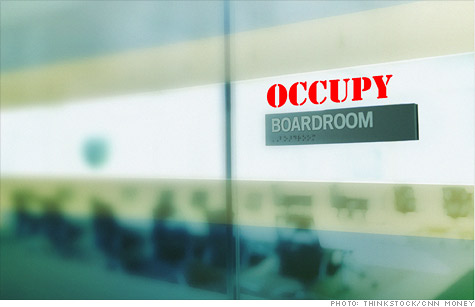
Shareholders are taking a more aggressive approach to pushing back against executive pay and board directors.
NEW YORK (CNNMoney) -- Shareholders across the United States are uniting, creating a movement that could be dubbed Occupy Boardroom.
Long-term shareholders, including pension funds and mutual funds, are attempting to push out board members and fight back against executive pay packages.
And unlike Occupy Wall Street, the police can't shut it down.
"Shareholder rights are reaching a tipping point, and the balance of power is really shifting from companies to shareholders," said Mike Mayo, a banking analyst at investment firm CLSA.
Three years after the financial crisis and the ensuing government bailouts, banks have been the primary targets of shareholders' wrath and negative votes.
Last week, 55% of Citigroup's (C, Fortune 500) shareholders voted against CEO Vikram Pandit's $15 million pay package for 2011, a year when the bank's stock fell 44%. While the vote is non binding, it sends a clear signal to management that shareholders want change.
Goldman Sachs (GS, Fortune 500) recently received a letter from Sequoia Fund, asking Goldman's board to oppose the reelection of director James Johnson, who had been Fannie Mae's CEO from 1991 to 1998. Sequoia said Johnson has been at the center of "egregious corporate governance debacles" including the events that led up to the housing crisis.
Sequoia has also asked its investors to vote against Johnson if he stands for reelection to the board of Target (TGT, Fortune 500), on which he currently serves.
Institutional Shareholder Services (ISS), which advises shareholders on proxy voting, has asked shareholders to vote against Bank of America (BAC, Fortune 500) director Charles Rossotti, noting that one of his family members works at a law firm that provides services to the bank. Bank of America's meeting is slated for May 9.
"I think there's been more recognition of importance of corporate governance within the investment making framework," said Mike McCauley, who runs investments for Florida's pension and non pension investments. "There's a higher level and engagement now on voting and other issues that come up for vote among investors."
Meanwhile, in the United Kingdom, shareholders may vote down Barclays (BCS) CEO Bob Diamond's pay package at its annual shareholders' meeting Friday.
Adding to the drama, protesters are showing up and disrupting annual meetings decrying what they deem unfair pay practices and tax rates.
On Tuesday, hundreds protesters showed up at Wells Fargo's (WFC, Fortune 500) annual meeting in San Francisco. Protesters are also expected to disrupt General Electric's (GE, Fortune 500) shareholders meeting Wednesday.
While the protests seem to be offshoots of Occupy Wall Street, it's the pushback from shareholders that have historically taken more passive roles that's surprising corporate executives.
"There's a certain righteous indignation that shareholders are developing because of extreme pay packages," said Andrew Lo, a professor of finance at Massachusetts Institute of Technology. "It indicates the depth of the frustration."
Some investors say this year's shareholder activism is also a byproduct of what was included, and excluded from the 2010 Dodd-Frank Act.
The Dodd-Frank laws allow shareholders to vote against compensation plans via a so-called say on pay vote at annual meetings, but the legislation didn't include a proxy access rule that would have given shareholders the right to nominate board directors.
After provisions like proxy access were kept out of Dodd-Frank, many pension funds saw the need to become more visibly engaged in corporate governance matters at companies where they hold large stakes, said Carol Drake, chief external affairs officer at Ohio's pension fund, which has $73 billion under management.
"We feel that we need to use our voice in a more collective way," said Drake. "We've always been involved but we decided that it was important to become more vocal."
Now that shareholders are standing up, it's unlikely that they'll sit down.
"We've become more targeted in our approach, and we're filing shareholder proposals," said Drake. "I don't see us going back to not doing that."
Meanwhile, what's still unknown is just how significant the response will be from Corporate America.
"Citi's Board of Directors takes the shareholder vote seriously, and along with senior management will consult with representative shareholders to understand their concerns," was Citi's response.
Goldman Sachs' spokesperson said that its board has recommended that its shareholders reelect Johnson at its May 24 annual meeting.
Since such say on pay votes are non binding, it's too early to see whether the shareholder push back will lead to real changes at U.S. corporations.
Meanwhile Mayo, a Wall Street gadfly and the author of the appropriately named "Exile on Wall Street: One Analyst's Fight to Save the Big Banks from Themselves," said he's willing to lead the Occupy Boardroom charge.
"A lack of capitalism is what caused the problems of the financial crisis," said Mayo. "Now we're seeing owners exercising their rights. They're trying not to be second class citizens anymore."
No comments:
Post a Comment